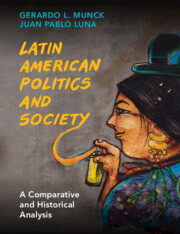Refine search
Actions for selected content:
36885 results in Cambridge Textbooks
1 - Prelude: Symbiosis
- from Part I - Things You Just Gotta’ Know
-
- Book:
- Mathematical Methods and Physical Insights
- Published online:
- 15 July 2022
- Print publication:
- 16 June 2022, pp 3-5
-
- Chapter
- Export citation
26 - Interlude: Rotations
- from Part IV - Linear Algebra
-
- Book:
- Mathematical Methods and Physical Insights
- Published online:
- 15 July 2022
- Print publication:
- 16 June 2022, pp 368-404
-
- Chapter
- Export citation
41 - Partial Differential Equations
- from Part VI - Differential Equations
-
- Book:
- Mathematical Methods and Physical Insights
- Published online:
- 15 July 2022
- Print publication:
- 16 June 2022, pp 663-693
-
- Chapter
- Export citation
36 - Fourier Transforms
- from Part V - Orthogonal Functions
-
- Book:
- Mathematical Methods and Physical Insights
- Published online:
- 15 July 2022
- Print publication:
- 16 June 2022, pp 569-603
-
- Chapter
- Export citation

Latin American Politics and Society
-
- Published online:
- 11 June 2022
- Print publication:
- 09 June 2022
-
- Textbook
- Export citation

Data-Driven Science and Engineering
- Machine Learning, Dynamical Systems, and Control
-
- Published online:
- 10 June 2022
- Print publication:
- 05 May 2022
-
- Textbook
- Export citation
List of Figures
-
- Book:
- Politics and International Law
- Published online:
- 27 June 2022
- Print publication:
- 09 June 2022, pp x-xv
-
- Chapter
- Export citation
Part IV - Social Rights as a Problem for Democracy
-
- Book:
- Latin American Politics and Society
- Published online:
- 11 June 2022
- Print publication:
- 09 June 2022, pp 429-430
-
- Chapter
- Export citation
13 - Sustainable Development and Neoextractivism: Growth, the Environment, and Social Action
- from Part IV - Social Rights as a Problem for Democracy
-
- Book:
- Latin American Politics and Society
- Published online:
- 11 June 2022
- Print publication:
- 09 June 2022, pp 464-488
-
- Chapter
- Export citation
Preface
-
- Book:
- Politics and International Law
- Published online:
- 27 June 2022
- Print publication:
- 09 June 2022, pp xvii-xix
-
- Chapter
- Export citation
Part I - Fundamentals
-
- Book:
- Politics and International Law
- Published online:
- 27 June 2022
- Print publication:
- 09 June 2022, pp 1-2
-
- Chapter
- Export citation
Introduction: - Latin American Politics and Society
-
- Book:
- Latin American Politics and Society
- Published online:
- 11 June 2022
- Print publication:
- 09 June 2022, pp 1-14
-
- Chapter
- Export citation
About the Authors
-
- Book:
- Latin American Politics and Society
- Published online:
- 11 June 2022
- Print publication:
- 09 June 2022, pp xvii-xviii
-
- Chapter
- Export citation
7 - Political Parties and the Citizen–Politician Link: The Persistent Crisis of Representation
- from Part II - Problems of Democracy in a Democratic Age
-
- Book:
- Latin American Politics and Society
- Published online:
- 11 June 2022
- Print publication:
- 09 June 2022, pp 238-270
-
- Chapter
- Export citation
Acronyms
-
- Book:
- Politics and International Law
- Published online:
- 27 June 2022
- Print publication:
- 09 June 2022, pp xx-xxii
-
- Chapter
- Export citation
11 - The New Violence: Homicides, Drugs, and the State
- from Part III - Civil Rights as a Problem for Democracy
-
- Book:
- Latin American Politics and Society
- Published online:
- 11 June 2022
- Print publication:
- 09 June 2022, pp 386-428
-
- Chapter
- Export citation
6 - Political Inclusion and Institutional Innovations: Women, Indigenous Peoples, Afro-Descendants, and Ordinary People
- from Part II - Problems of Democracy in a Democratic Age
-
- Book:
- Latin American Politics and Society
- Published online:
- 11 June 2022
- Print publication:
- 09 June 2022, pp 201-237
-
- Chapter
- Export citation
2 - Making International Law
- from Part I - Fundamentals
-
- Book:
- Politics and International Law
- Published online:
- 27 June 2022
- Print publication:
- 09 June 2022, pp 35-102
-
- Chapter
- Export citation
8 - The Protection of Civil Rights: A Pending Task for Democracies
- from Part III - Civil Rights as a Problem for Democracy
-
- Book:
- Latin American Politics and Society
- Published online:
- 11 June 2022
- Print publication:
- 09 June 2022, pp 273-309
-
- Chapter
- Export citation
5 - Law of the Sea
- from Part II - Property Rights and Economic Exchange
-
- Book:
- Politics and International Law
- Published online:
- 27 June 2022
- Print publication:
- 09 June 2022, pp 175-203
-
- Chapter
- Export citation
